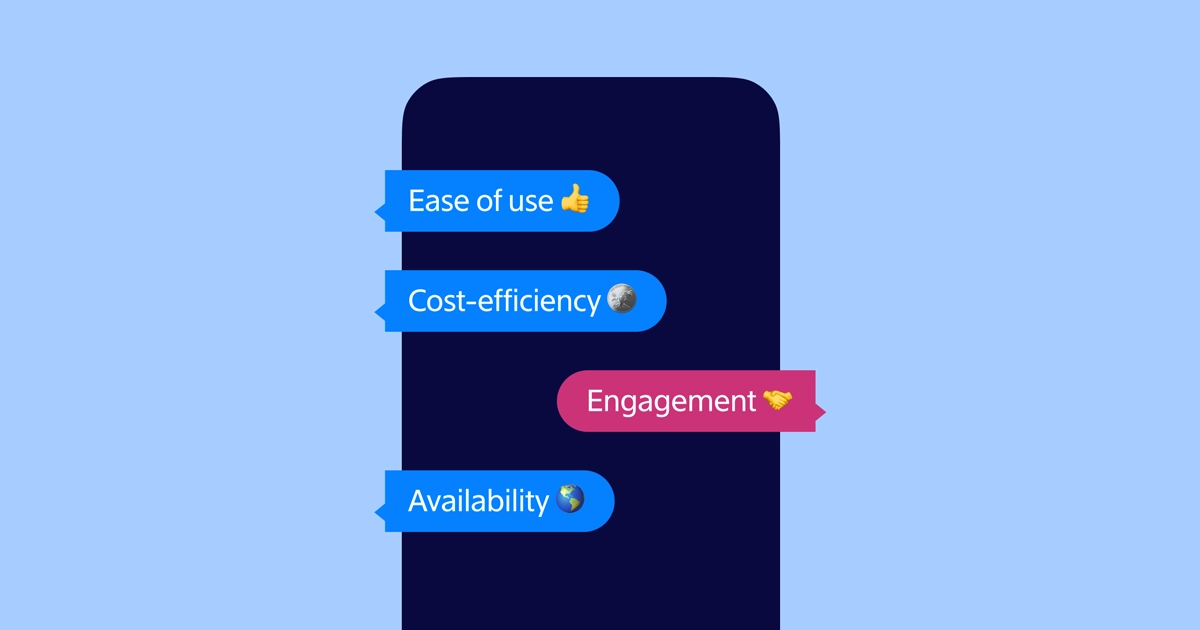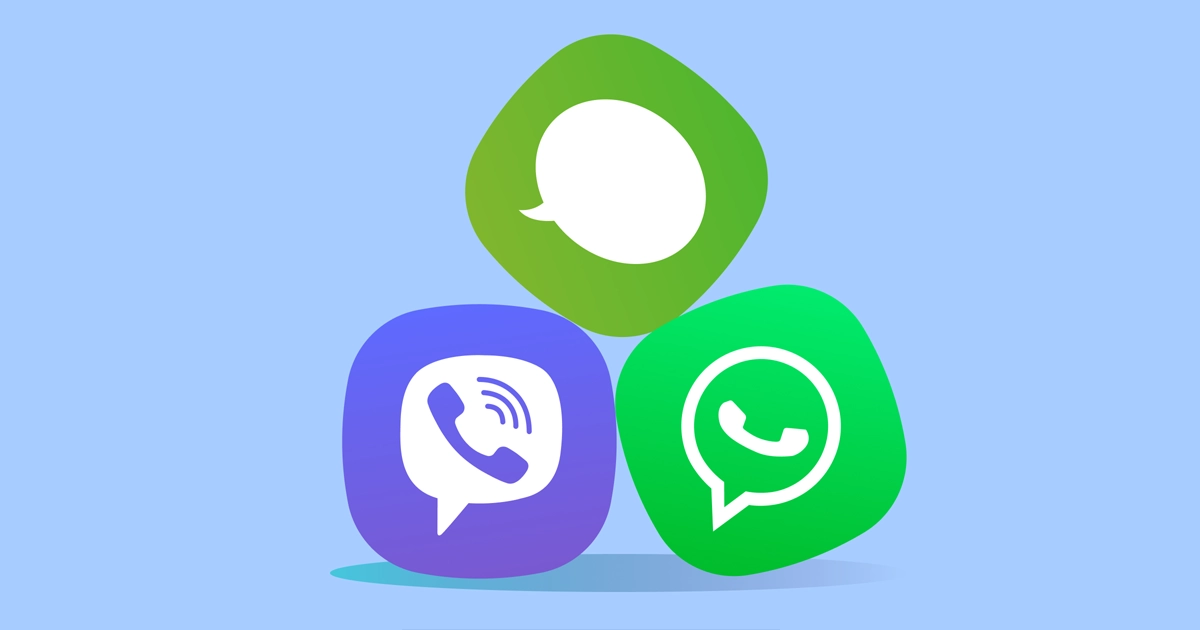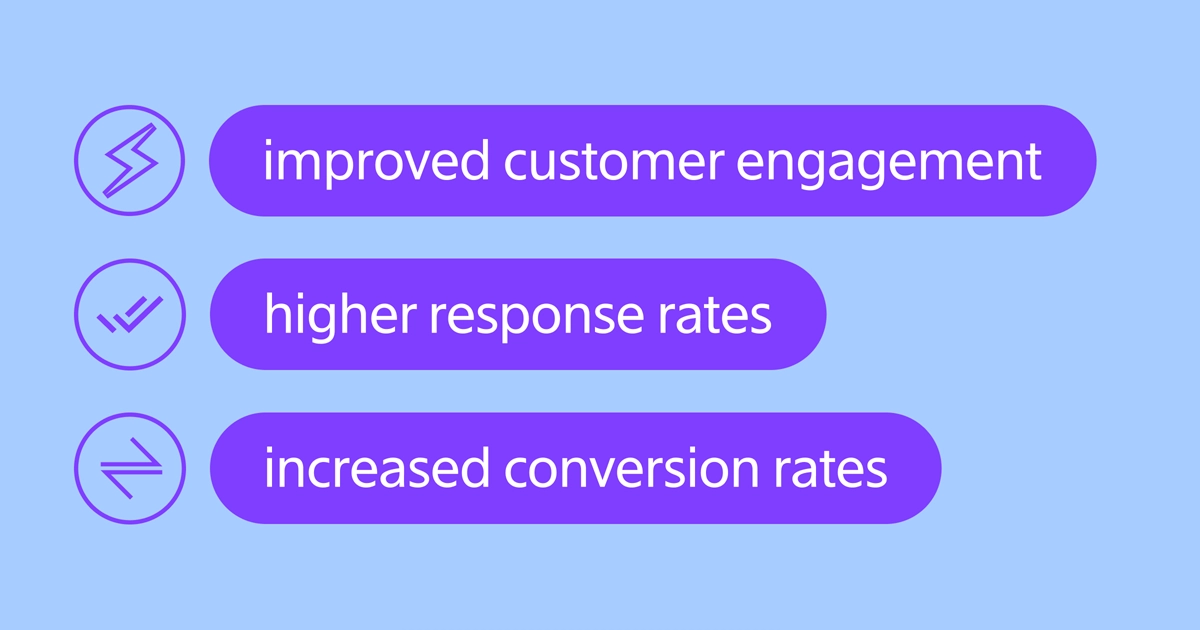What is Conversational Messaging: A Complete Guide
Published: Jul 3, 2023
Updated: Apr 9, 2025

Conversational messaging has emerged as a game-changer, revolutionizing the way clients and businesses interact on the human-electronic interface.
As businesses seek to expand their customer reach, enhance brand promotion, and boost sales, this continues to stand out as a powerful marketing tool.
Now, it even has the capacity to replace traditional forms of customer communication.
With the rise of messaging apps and the convenience of SMS, conversational texting offers a way to cut through the noise.
It allows you to have meaningful two-way conversations with customers.
Curious to find out more?
Here’s how your business can benefit by switching to using messaging.
What is Conversational Messaging?
Conversational messaging, in essence, is the art of informal communication between two or more parties using text messages.
Within the framework of business-customer relations, conversational text messaging has become a go-to tactic.
Many opt for this to increase consumer engagement by leveraging accessibility and informality, often as part of SMS marketing strategies.
Using conversational messaging, businesses can significantly increase client engagement rates.
So, if you're looking to build stronger customer relationships, incorporating conversational marketing into your strategy may be the key to unlocking exponential growth.

Main Types of Conversational Text Messaging
There are 2 types of conversational text messaging: asynchronous and synchronous.
What is Asynchronous Conversational Text Messaging?
Asynchronous messaging refers to a type of two-way communication that occurs when one party sends a message and the other party replies when they have time.
In other words, this is a conversation that can be left and picked up at any time without losing its relevance.
This type of conversational messaging is ideal for customer service inquiries that do not require immediate attention.
Asynchronous messaging is also great when it comes to dealing with complex issues that require more than one session to fix.
If you want to let your customers communicate with your businesses at their own pace, this is the way to go.
Get Started Now
Reach your clients now and claim your 30-day free trial. No credit card required.
What is Synchronous Conversational Text Messaging?
On the opposite end of the spectrum is synchronous messaging.
This refers to real-time communication where both parties are actively engaged.
This is a type of conversational text messaging that has a defined beginning and end.
Synchronous messaging is ideal for urgent customer support inquiries that require immediate attention.
With the rise of AI customer experience, this type of conversational messaging is often automated to quickly answer common inquiries in real time.

What are the Advantages of Conversational Texting?
Conversational texting offers several advantages over traditional forms of customer-business communication, such as email or phone calls, especially if you're implementing an omnichannel messaging approach.
1. Convenience
Gone are the days of having to wait on hold or schedule a call.
Conversational texting puts the power back in the hands of customers, allowing them to communicate with businesses with SMS chat.
It’s fast, simple, and efficient.
2. Accessibility
Conversational SMS texting is accessible to anyone with a mobile phone, making it easy to connect with customers anytime and anywhere.
3. Cost-Effectiveness
Automating minor customer inquiries through conversational messaging is more cost-effective than traditional forms of communication.
If you were to use phone calls or emails, it would require more resources in terms of time and human capital.
4. Engagement
By engaging with customers in a natural and familiar tone, businesses can create a sense of intimacy and connection with their audience.
This leads to stronger brand loyalty and increased customer satisfaction.

Conversational SMS Vs. WhatsApp Vs. Viber
There are several messaging apps for conversational text messaging, the most popular of which are SMS, WhatsApp, and Viber.
Each of these messaging channels has its advantages and disadvantages, depending on the needs of the business and customer preferences.
The key is to find a conversational messaging platform that feels most authentic and best serves your business’s goals.
Conversational SMS
Business text messaging is the most widely used form of conversational messaging, as it is accessible to anyone with a mobile device, no matter if it's iOS or Android.
SMS is also the only way to engage customers in a conversation without an internet connection.
Conversational Messaging with WhatsApp
WhatsApp Business is a popular messaging app with billions of users.
While it was only used by individuals for a long time, many businesses today have adopted it as their preferred method of communication.
WhatsApp allows businesses to create groups and broadcast messages to customers, making it easy to reach a large audience.
However, this app does require an internet connection to function.
This may pose a problem for businesses that prioritize instantaneous visibility and engagement through conversational messaging.
Conversational Messaging with Viber
Viber Business is another messaging app that is fairly similar to WhatsApp in the way that it operates.
This conversational text messaging app might suit your business if you’d like to create a public account that would make it easy for customers to find and message you.
Similarly to Whatsapp, a drawback to Viber is its ability to work solely when connected to the internet.
However, if that’s not an issue, then this conversational messaging app could be perfect for your business.

Why Should Businesses Switch to Conversational SMS?
As businesses navigate the digital landscape, conversational SMS text messaging further proves its relevance with several perks in retail and beyond.
This trending communication tool is cost-effective and convenient.
And on top of that, it offers several advantages that solve many of your customer engagement problems through personalization and accessibility.
By leveraging SMS messaging, businesses can create personalized customer interactions, resulting in a more memorable and engaging experience.
Furthermore, they take up less space on a user's screen, increasing the likelihood of them reading and digesting the entire text in the form of a simple notification.
This is unlike emails, which often go unopened, buried among a sea of others in the junk folder.
There’s no denying how impactful the efficient use of 160 characters can be for your business.
Whether you’re sending a personalized promo code, seasonal greetings, or even reminders on special days, a conversational SMS can work wonders for customer acquisition and retention.
Conversational Text Messaging Best Practices
Convinced that switching to conversational messaging is the right move for your business?
These are the best practices to follow to ensure a smooth and efficient transition.
Use a tone and language that feels informational yet natural and friendly
Opt for concise language and avoid lengthy sentences or paragraphs
Make sure the important information stands out and the main point of the message is accurately perceived
Use automated texting to send keyword-triggered messages
Send GIFs, emojis, and other visuals to add personality to your message (sparingly and appropriately)
Use proper grammar and spelling and avoid using all caps, excessive punctuation, or unfamiliar text abbreviations
Make sure your CTAs are clear and the recipient knows what you want them to do next
Your customers expect you to stay respectful and professional even if the tone of the message is conversational
Think about the recipient's perspective and what they may be experiencing, and tailor your tone and approach accordingly
Double-check for any errors or typos before hitting send to ensure your message is clear and accessible
In a nutshell, conversational messaging is a powerful tool for businesses looking to connect with customers in a more personal and engaging way.
Whether through SMS, WhatsApp, or Viber, conversational marketing offers several advantages over traditional forms of communication, including convenience, accessibility, and personalization.
Make the switch to conversational texting today and watch the effects it has on scaling up your customer experience.
